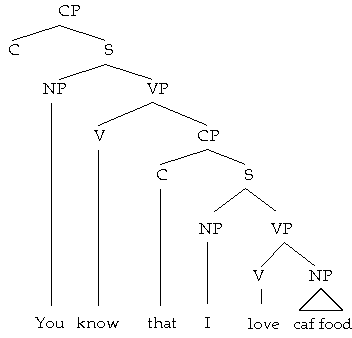
A complement clause is a clause which is used as the complement of some other word (typically as the complement of a verb, adjective or noun). In the sentence ‘The news that she was dead shocked us all’, ‘that she was dead’ is a noun complement clause attached to the noun news. In grammar, a complement is a wor phrase or clause that is necessary to complete the meaning of a given expression. Discussion: The term complement clause is extended by some analysts to include clauses selected by nouns or adjectives. Define complement clause.
English dictionary definition of complement clause. You will also gain tips on how to recognize words that introduce these types of clauses. Without the complement, the clause would not be complete. We usually go away in the spring.
Yet unlike (2), where the matrix clause and the complement clause each have their own subject (we, the children), the sentences in (4) contain only a single overt subject, the one in the matrix clause. Evidence that the complementizer functions as the head of its clause includes that it is commonly the last element in a clause in head-final languages like Korean or Japanese, in which other heads follow their complements, whereas it appears at the start of a clause in head-initial languages such as English, where heads normally precede their. Most phrases and clauses will include a complement of some kind. Traditionally, a complement is a constituent of a clause , such as a noun phrase or adjective phrase, that is used to predicate a description of the subject or object of the clause.

That clauses can also occur as complements to nouns. In these cases they are very similar to that relatives. There are three distinctions between these two constructions: 1. Relatives can attach to.
This prospective action is expressed in the infinitival complement clause. Since in an active sentence such as (9) the addressee is the grammatical object of the main clause , it is not surprising that this constituent functions as controller of the empty subject of the subordinate clause. In contrast, a promise involves a commitment of the.
What is a complement in grammar? It’s a wor clause , or phrase that’s needed to complete a given expression. For example, “Every morning is a gift. Read on to learn more!
In this sentence, a gift is the complement. Oh, well, back to the drawing board. And just when I thought I understood that a noun clause was so named because it functioned as a noun within a given sentence. An object complement completes the meaning of the object.
It can be in many grammatical forms. I have answered ‘what is an object complement ’, giving various grammatical types for simplicity. Notice that in the first member of each of the above pairs, the complement is a noun phrase and in the second an adjective phrase. In all four cases — as in all instances of these two patterns — there is a “copular” relation between the complement and another element of the clause. This is called a complement clause.
Grammar in EAP Clauses and Simple Sentences Clauses: Introduction. A clause is the main unit of grammatical structure. It usually consist of a subject and a predicate.
It consists of one or more groups. A typical structure of a clause is SPCA - subject, predicator, complement , adjunct. Subject is typically realised by a nominal group.
A finite clause can stand alone as an independent clause (a sentence), or it can serve as a coordinate clause , a subordinate clause , or a supplementary clause. The unmarked order appears to be the main clause followed by the subordinate clause , but inversion of this order is possible, as well. Complements act like modifiers to add.
Žádné komentáře:
Okomentovat
Poznámka: Komentáře mohou přidávat pouze členové tohoto blogu.